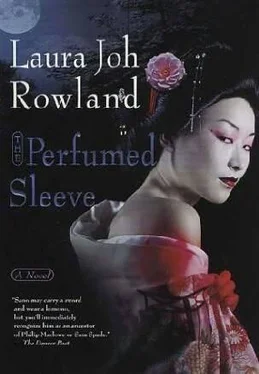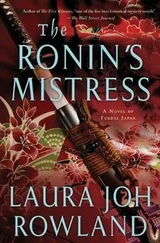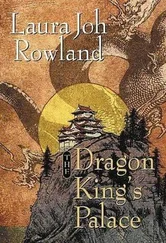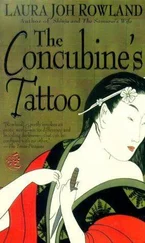Efforts at nonchalance failed Koheiji. He stood rigid with anxiety, his back, hands, and heels pressed to the wall. “I didn’t kill Makino. There was no show that night.”
“Who was the woman?” Hirata said. “Was it Okitsu? Did her sleeve get torn when things got rough?”
“No!” Vehemence raised Koheiji’s voice. “Makino brought in courtesans for me to use. But not that night.” Again Hirata heard the tinny note in the actor’s voice that signaled lies. “I didn’t see Makino at all. Okitsu will tell you-she and I were together the whole night.”
Frustration filled Hirata because Koheiji seemed determined to stick to his story. The actor had no reason to tell the truth when lying would protect him better. Under different circumstances, Hirata would have applied physical force to make Koheiji talk. But Sano didn’t approve of forced confessions because even innocent people would incriminate themselves if hurt or frightened enough. Furthermore, he’d told Hirata to be discreet in his inquiries, and Hirata meant to do everything right this time.
“What about last night?” Hirata said, switching the interrogation to a different course. “Where were you and what were you doing then?”
Koheiji’s painted face went blank with confusion. “I was here, at the theater,” he said slowly, as if to give himself time to figure out where the conversation was heading. “We were rehearsing a new play.”
“When did you begin and when did you finish?” Hirata said.
“The rehearsal started around the hour of the boar. We worked long past midnight. We slept in the dressing rooms until it was time to get ready to perform this morning.”
“Were you with the rest of the cast during the whole rehearsal?”
Koheiji nodded. “I’m the star. I’m in every scene. I may have slipped outside between acts a few times, but…” His posture had gradually relaxed since Hirata had dropped the subject of Makino’s murder, but he spoke with caution: “Why are you asking me all this? What’s so important about last night?”
“Last night Lord Matsudaira’s nephew Daiemon was murdered,” Hirata said. He watched emotion contract the muscles of Koheiji’s face under the garish makeup. But he couldn’t tell whether the actor was surprised by the news or worried about why Hirata had brought it up.
“Hey, I’m sorry to hear that,” Koheiji said in the tone appropriate when speaking of the death of a prominent citizen. “How did it happen?”
Either he didn’t know or he thought it wise to feign ignorance, Hirata speculated. “Daiemon was stabbed.”
“Oh,” Koheiji said. Tilting his head, he regarded Hirata with a mixture of curiosity and apprehension. “What does his death have to do with me?”
“Did you know him?” Hirata said.
“Not very well. I met him at parties where actors were hired to entertain the guests. But wait just a moment.” Koheiji thrust his hands palms up toward Hirata and waggled them. “You don’t think I had something to do with…?” He chuckled nervously as he dropped his hands. “I haven’t seen Daiemon in months. Not since a party at his uncle’s house.”
But here was a connection between Koheiji and Daiemon, and perhaps a link between the two murders. Hirata said, “Daiemon was in Senior Elder Makino’s estate the night Makino died. You didn’t see him then?”
Although Koheiji shook his head, his face acquired a queasy expression. “I had no idea he was there.”
But even if Koheiji hadn’t seen Daiemon, Daiemon might have seen him, Hirata conjectured.
“Besides,” Koheiji said, “why would I kill him, when we barely knew each other?”
And what, Hirata wondered, might Daiemon have seen Koheiji doing? Beating Makino to death? Maybe the actor had later, somehow, found out that Daiemon had seen him, and killed Daiemon to keep him quiet. Yet if Daiemon had witnessed the murder, why hadn’t he said so when Sano interrogated him? Hirata began to lose hope that solving one murder would solve both.
“Look,” Koheiji said, “you’ve got the wrong man. I’m sure your boss would be happy to have you pin both murders on me, but I didn’t kill Daiemon any more than I killed Makino. Okitsu will swear to it. So will the people at the theater.”
Despite his adamant denial, he’d lost his cockiness. His samurai garb and makeup contrasted pathetically with his fear of ruin. Just then, the curtain over the door lifted. A scowl-faced man stuck his head inside the room.
“It’s time for you to go onstage. Get out there right now!” the man told Koheiji, then vanished.
Koheiji breathed a glad sigh, as though reprieved at the brink of disaster. He scuttled past Hirata, who let him go, for the time being. Before darting out the door, he said, “If Daiemon really was in Makino’s estate that night, maybe he killed Makino. Just because he’s dead, it doesn’t mean he’s innocent. Why don’t you look into his business?”
That was exactly what Hirata must do, after he’d talked to Tamura, the other suspect Sano had sent him to investigate.
The play was the longest Koheiji had ever performed. He sang and ranted; he strutted across the stage; he romanced beautiful women; he fought a thrilling sword battle. The audience wildly cheered and applauded him, but for once he didn’t care. All he could think about was his visit from the sōsakan-sama’s chief retainer and how his situation had gone from bad to dire. He’d reached the height of success, and all he cared about was averting the demons of destruction, whose hot breath he could already feel on his neck.
As soon as the play ended, Koheiji rushed to his dressing room, hastily scrubbed off his makeup, and changed his costume for everyday clothes. He ran out to the street and spied a palanquin for hire.
“Take me to Edo Castle,” he told the bearers as he leaped into the vehicle.
While it bounced and veered along the streets, he brooded upon how his life seemed an endless series of good and bad luck, as though he’d been born under a star that shone brightly then went dark in unpredictable phases. He’d had the good fortune to be born the son of a rich merchant, but then his father had died, leaving nothing but debts. Koheiji found himself out on the street at age nine, forced to beg, rob, and sell his body. He was always running from the police, fighting off bigger boys who tried to steal his money; he slept under bridges.
His luck had turned when the Owari Theater took him in. At first Koheiji had been overjoyed at having shelter, food, and a chance at a glamorous, lucrative career. But he’d soon become embroiled in the vicious gossip, dirty tricks, and bullying that the struggling actors used against one another. Koheiji had had no choice but to do worse to his competitors than they did to him. He’d pushed one especially talented rival down the stairs and broken his back, crippling him. He’d made a lot of enemies, but his reward was lead roles in the plays. His star brightened.
But new troubles developed. Even the lead roles at the Owari paid a pittance. Koheiji still had to sell himself for money to buy costumes and have fun. He’d spent too much in the teahouses and pleasure quarter. He’d begun borrowing from moneylenders, run up more debts, and borrowed more money to pay the creditors who hounded him. Then he made the fortuitous discovery that rich men would pay to see him having sex. His shows had paid his debts and increased his popularity. If only he’d never met Judicial Councilor Banzan!
The old coot had demanded that Koheiji beat him with a leather strap while the girl watched. When Koheiji began striking Banzan, a sudden, furious rage possessed him. Banzan seemed to personify everyone who’d ever done Koheiji wrong, everyone he’d been forced to please. Koheiji didn’t stop until Banzan was bloody and unconscious. He’d had to pay his foe, Ebisuya, for help cleaning up the mess he’d made. A new cycle of debt and borrowing plunged him into despair, until Senior Elder Makino rescued him.
Читать дальше












